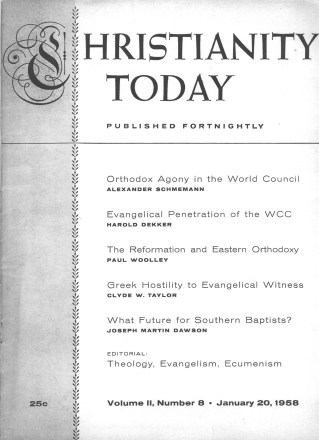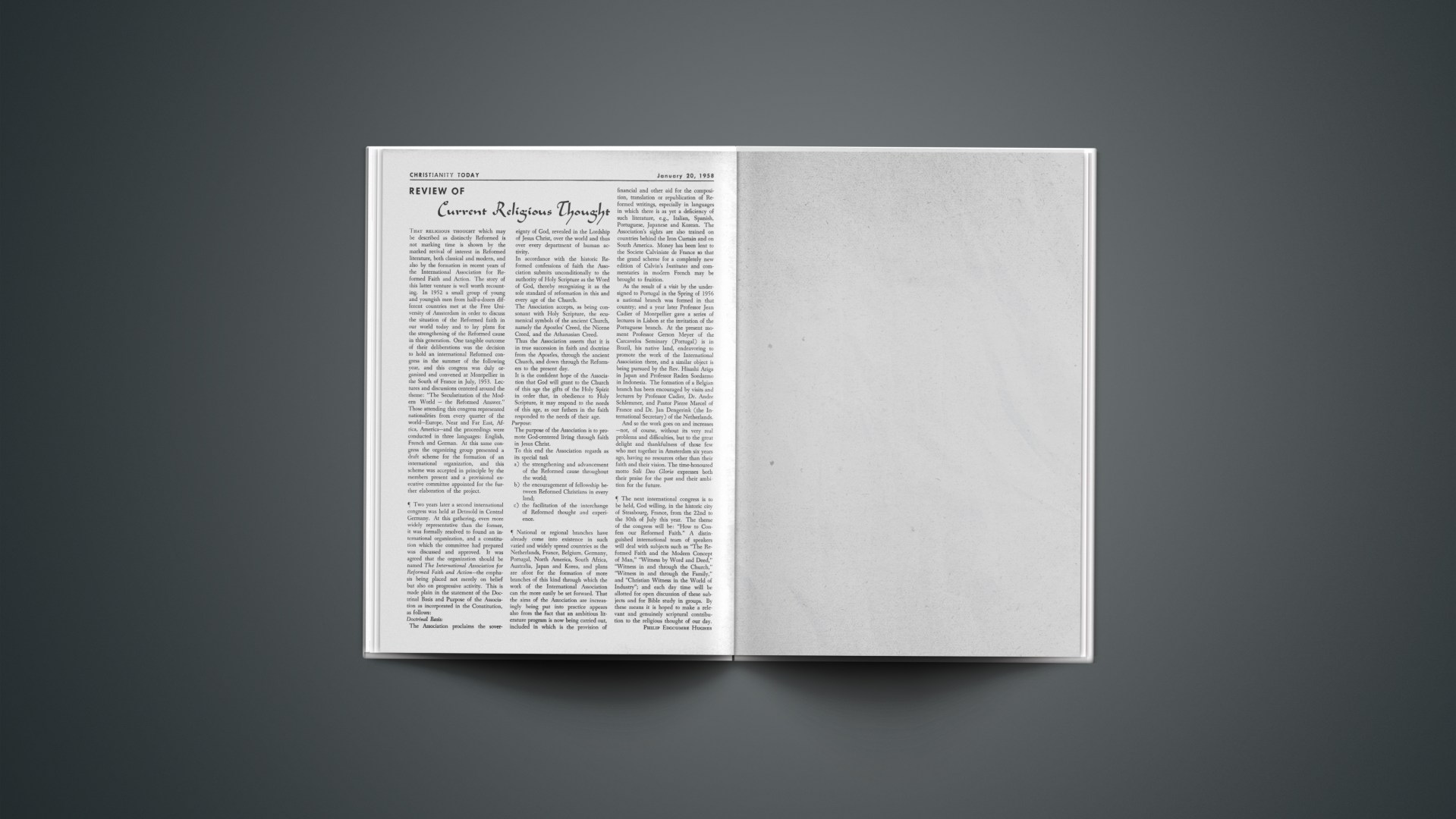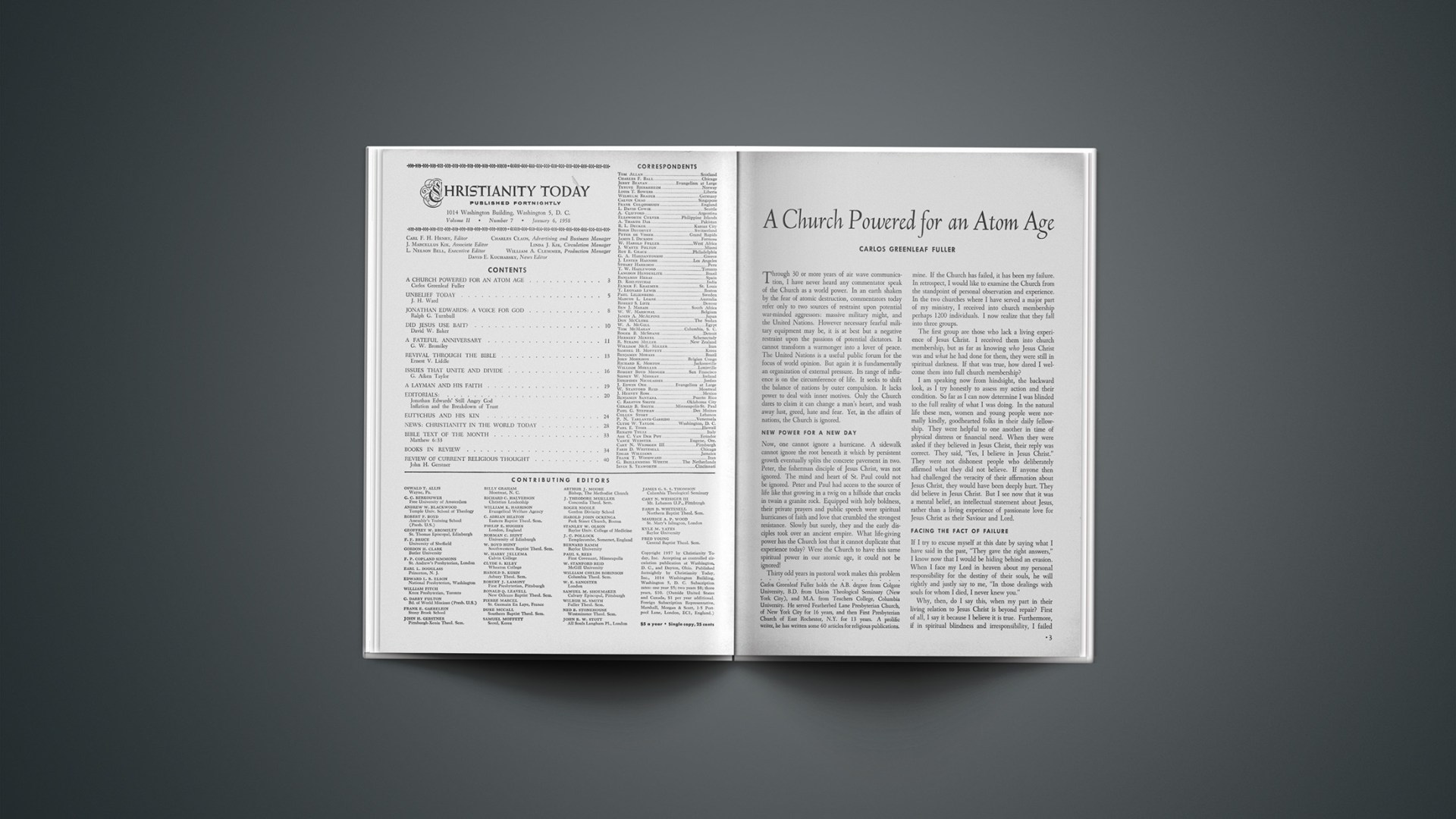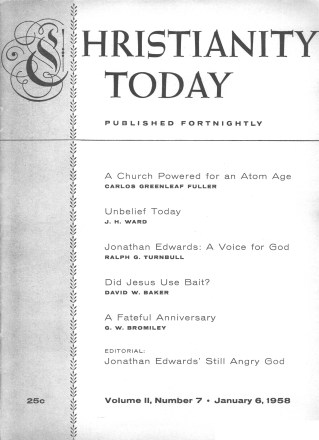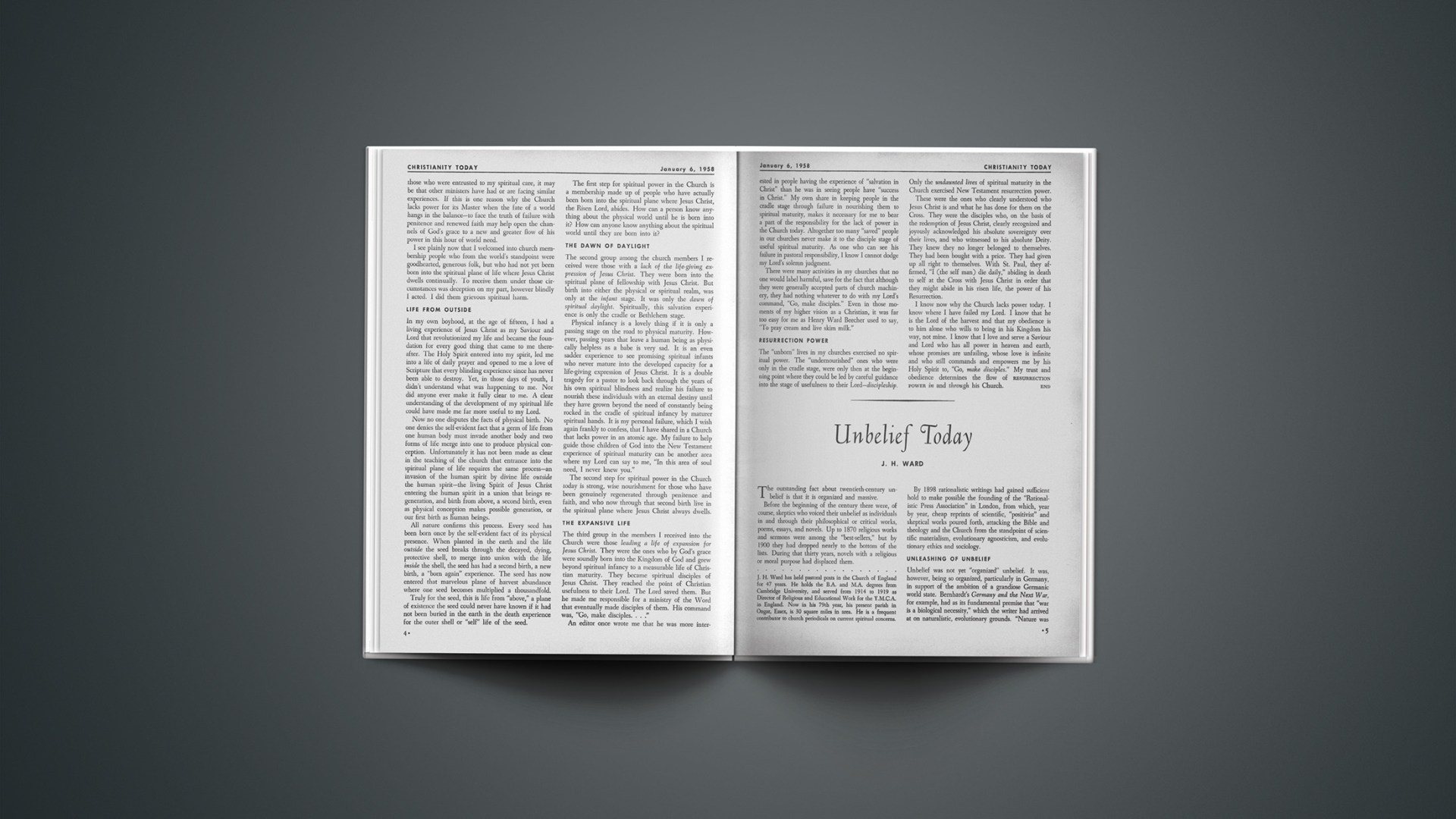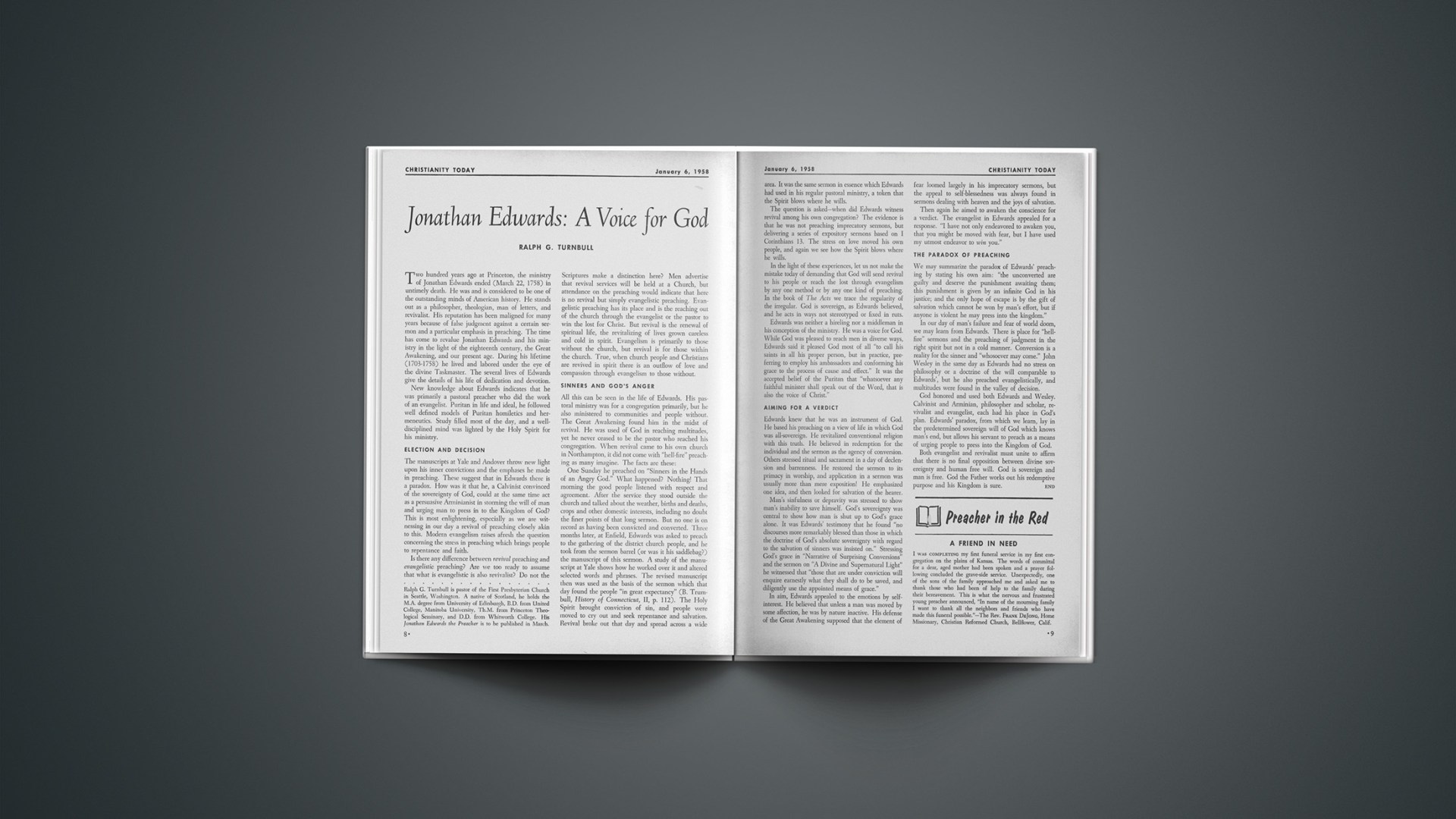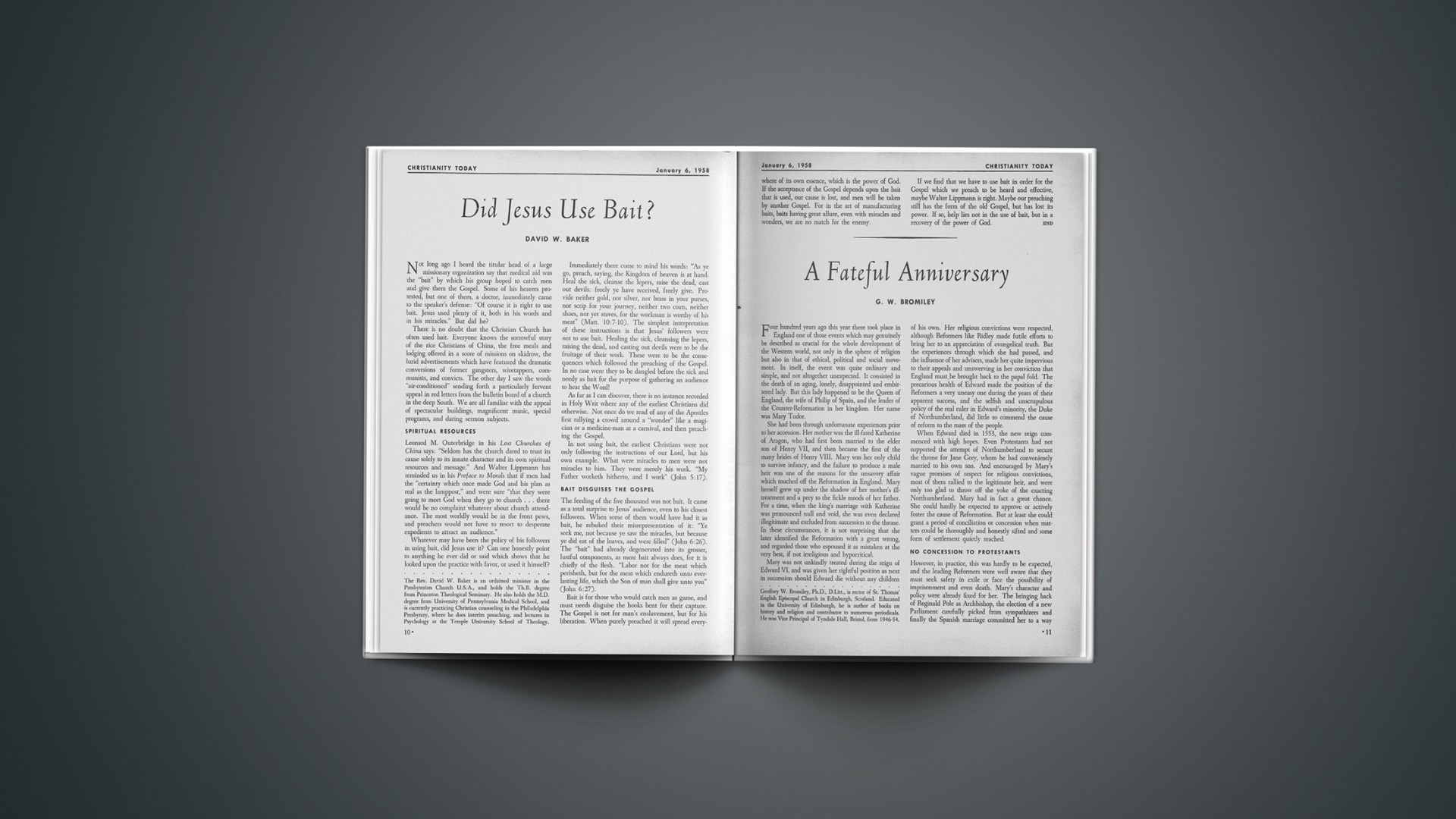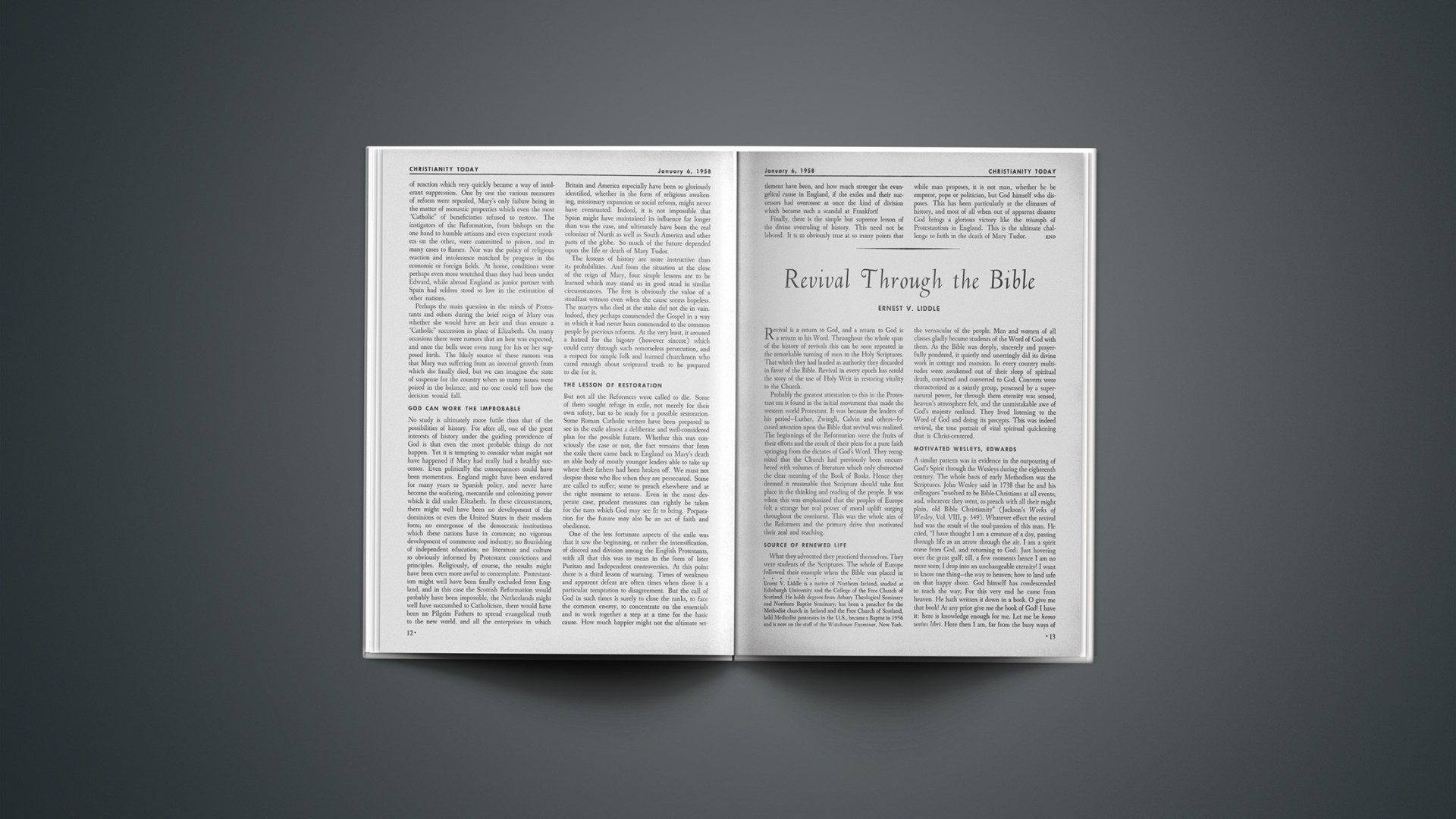No Common Field
Fundamentalism and the Church, by Gabriel Hebert, Westminster, 1957. $3.00.
This book has been receiving considerable publicity and it is difficult to understand why. It is not a great book in any sense of the word. It is interestingly written, but badly constructed. It contributes nothing new to some old problems and rarely meets directly and concisely the problems which it raises within its own thesis. The book is probably receiving its acclaim for one of three reasons: first, the subject of the book, including the word “Fundamentalism,” is an advertisement in this day when the book itself proves that the issues between Fundamentalism and Modernism are far from dead; second, the liberals are delighted to have someone take up the cudgels against the fundamentalists; third, the fundamentalists having been rubbed raw at various points, receive this book with considerable sensitivity.
Such comment immediately raises the question of what the author means and what any of us mean when we use the term “Fundamentalism.” There are “fundies,” “fighting fundies,” “conservatives,” “evangelicals,” “the orthodox,” and those who wish to remain “true to the main features of the Reformed tradition.” Hebert is very clear in pointing out how the word “Fundamentalism” arose, and he is clear in listing the “fundamentals” which lead to the term “Fundamentalism.” From that point on, however, he never really meets Fundamentalism on the basis of his own definition. Therefore, each man in reading this book, if he feels himself to be in the conservative tradition, is moved to raise the question whether Hebert is talking about him at all. This sort of thing is particularly striking as Hebert discusses the whole question of the inspiration of Scripture. When he talks about bibliolatry I am forced to conclude that I know no one who practices such. When he talks about “mechanical dictation,” I know of no one who holds such a view. Yet this sort of thing goes on and on, a constant criticism of those who hold to verbal inspiration: that they practice bibliolatry or that they believe in some view of mechanical dictation. I think Hebert is quite right in bringing up the whole question of inspiration as central to the discussion of Fundamentalism and the Church, but his book makes no contribution to the discussion.
Throughout the book the author gets off into unnecessary and unfortunate excurses. On pages 26 and 27 he is working on a problem between the I.V.F. and the S.C.M.; the controversy reflects largely the Australian context and is probably not applicable most places in this country. In any case, it is a discussion of the old problem of the individual versus the social gospel, and is really the sort of thing one would expect to find in a tract. Beginning on page 103 he gives almost 14 pages to a digest of a book by Bo Giertz. These 14 pages are one-tenth of the printed matter of Hebert’s book. The material from Bo Giertz is interesting and valuable, but entirely too long for illustration, and what Hebert is illustrating is not clear.
It is hard to discover the public whom Hebert is addressing. So much of the book seems to be naive in terms of the real issues at stake and the arguments on both sides that are available are well known to all the disputants. Is he saying that all our arguments would disappear and we would have real unity if we would cease making issues out of what we believe to be fundamentals? That is impossible. Take a statement like this on page 14: “all controversy between Christians needs to start from the unity which God has made.…” Is it not more exact to say that all controversy between Christians needs to start from a deep concern for God’s truth or God’s glory? We all agree that God’s truth will be one truth, but I think we all need to agree also that until we have that truth there must be controversy. We cannot get rid of the problem of the serious difficulties among men by pretending that the difficulties are not there or by pretending that they do not matter. Hebert makes this plain enough when he begins to talk about the Church, particularly from the Anglican viewpoint in the latter part of his book.
Some of his criticisms of the fundamentalists need to be taken to heart, particularly his well-founded criticism that the fundamentalists are slow to recognize the social and sociological implications of their own salvation. He points up also at least the implication that someone soon needs to make clear what fundamentalists believe about the inspiration of Scripture. That this sort of thing has been done by men like Warfield does not mean that this position is being publicized today. If the fundamentalists are so strenuous in their support of verbal inspiration or verbal inerrancy, then someone modern, scholarly and conservative needs to write the book which can be a kind of “Q.E.D.” on the whole problem. Hebert has brought to our attention also that many of the Fundamentalist movements, particularly among college students—Inter-Varsity, Young Life, etc.—have given no serious thought to ecclesiology. Most of them are movements in independency.
One concludes from this book that in this controversy two different teams are playing on two different fields with slightly different sets of rules. Once in a while one team lobs a ball to the other field and hits someone in the head. This brings immediate reaction, but nothing is settled. Perhaps in the new ground swell of the conservative tradition in our day it will be possible for both teams some day soon now to play on the same field with the same rules, and settle some old scores.
ADDISON H. LEITCH
Life Of Augustine
Son of Tears by Henry W. Coray, Putnam, New York, 1957. $3.95.
This is a novel based on the storm-swept life of St. Augustine, who in himself forms a fascinating chapter in the history of the Christian church.
Mr. Coray states his purpose: “I began to read the works of St. Augustine.… Then I gradually developed the conviction that I had to bring him again to life. I found that the outline of his early years lies half buried in his Confessions. Son of Tears seeks to interpret one of the great minds as well as one of the most complex characters in history.”
This statement contains the seeds of many of the novel’s difficulties: Mr. Coray has attempted too much. Explanations of Manichean, Donatistic, and Pelagian heresies, along with other historical data and interpretation of Augustine’s writings all constitute too much burden for the novel. Furthermore, the fact that the author tries to cover his subject’s entire lifetime almost compels him to tell us rather than show us Augustine’s feelings. Of the death of Augustine’s son we are told, “A raging fever sapped Adeodatus’ strength. He lapsed into a coma. On the thirty-fourth day of the illness, while his father and a few of the monks looked on, brokenhearted, he breathed away his life. Augustine groped his way to his chamber to pray, the hot tears coursing down his cheeks.”
We can accept these perfunctory statements as facts, but we cannot very well empathize with the emotions. This spells failure to the project of bringing Augustine fully to life again.
Along this same line, Mr. Coray falls into a habit, all too prevalent in Christian novels, of explaining too much. One is reminded of Charles Lamb’s letter to William Wordsworth: “An intelligent reader finds a sort of insult in being told: I will teach you how to think upon this subject.… Very different from Robinson Crusoe, The Vicar of Wakefield, Roderick Random, and other beautiful bare narratives. There is implied an unwritten compact between author and reader: I will tell you a story, and I suppose you will understand it.”
Quotations from the Confessions at climactic points throughout the novel tend to destroy any artistic illusion which had been built up, and lowers the suspense by reminding us that all will be well in the end. Quotations would, of course, be very much in order in an interpretative literary biography, but they seem injurious to the novel. (Perhaps, after all, Mr. Coray simply chose the wrong medium.)
But the novel is honest on the subject of Augustine’s youthful sin, and thus avoids the very common and lamentable practice of whitewashing Christian biography to an impossible extent. There is immense intrinsic interest shown in the turbulent life of Augustine, with his passionate love for truth, for the lovely Melanie, and finally for the church. Such a life could hardly fail to command attention. It does not fail to do so in Son of Tears.
VIRGINIA RAMEY MOLLENKOTT
Lesson Commentaries
Douglass Sunday School Lessons, by Earl L. Douglass, Macmillan, 1957. 482 pp., $2.95. Tarbell’s Teachers’ Guide, by Frank S. Mead, Revell, 1957. 383 pp., $2.75.
Rozell’s Complete Lessons, by Ray Rozell, Rozell & Co., Owensboro, Ky., 1957. 342 pp., $2.95.
These commentaries are based on the International Sunday School Lessons, the International Bible Lessons for Christian Teaching, and on the Home Daily Bible Readings, copyrighted by the Division of Christian Education of the National Council of the Churches of Christ and the International Council of Religious Education.
Three well-known teachers’ guides on the International Sunday School Lessons are considered in this review. Recent estimates by Sunday school authorities indicate that 60 per cent of the Sunday Schools throughout the United States are still using the International Lessons for some classes in the local Sunday Schools. No wonder, then, that writers on the International Bible Lessons continue to work assiduously every year on the preparation of teachers’ guides.
All three volumes offer a vast amount of information concerning the three topics for the year. Twenty-six weeks are given to “New Testament Teachings about the Church.” The third quarter is given to “Principles of Social Justice.” The last quarter is devoted to lessons on “The Life of Christ.”
First impressions count. This is where the format and type used in printing make a difference. Rozell has the edge on pleasing format. The layout in his volume is simple and easy to follow. Each lesson has a box entitled, “For the Teacher Only,” Rozell makes it easy, then, for the teacher to think quickly about the needs of the pupil, the aims of the lesson and a suggested approach to the lesson.
Douglass and Mead, however, have both included daily Bible readings and audio-visual resources which Rozell has omitted.
The teacher who is looking for a simple outline of the content will probably enjoy Rozell’s volume. For the teacher who wants to enrich and support the lessons with visual aids and illustrative material, he will find extensive resources in Douglass’ volume. In addition to lessons that throw light on the Biblical text, Douglass offers resources of visual aid materials for the temperance emphasis throughout the year’s work. Mead includes a list of addresses of producers whose material is used in the listing of audio-visual materials.
Douglass and Mead have used the King James Authorized Version, while Rozell has chosen to develop the lesson based on the Revised Standard Version text.
All three authors aim at taking the biblical text and making it relevant to contemporary life. Mead gives special help in adapting the lesson for intermediates and seniors in the local Sunday School. Douglass has the most helpful development of the lesson following a lesson plan. However, he does not go into a strict exposition of the text itself, but draws from the portion of Scripture and brings a great deal of material to bear on the contemporary needs as they are relevant to the universal principles of Scripture. Rozell does not provide any topics or questions for discussion. Douglass orients his questions and topics for discussion around the biblical text; whereas Mead seemingly is more concerned with contemporary problems and social issues in the use of suggested questions and topics of discussion for the teacher.
Douglass is more provocative as he develops his ideas. He attempts to inject the problem situation and then uses the biblical resources to solve the problem. Mead, on the other hand, tends to use many quotations from a variety of sources, and in that way throw some light upon the lesson outline. Rozell has more of a running comment on the ideas that are found in the biblical text; there are numerous helpful statements but not much illustrative material.
All three authors offer more than the average Sunday School teacher will use in the Sunday School hour. The best procedure, of course, would be to have all three volumes on one’s desk and gather the best for the teaching of the lesson.
If the reviewer could choose only one, he would prefer Douglass’ development of the lessons.
MILFORD SHOLUND
Peloubet’s Select Notes, by Wilbur M. Smith, Editor, Wilde, 1957. 455 pp., $2.95.
Since a day in October of 1924 when a synodical executive suggested that he supplement his meager library with some copies of Peloubet’s Notes, the present reviewer has consistently used and appreciated the successive volumes of this series. Under the able editorship of Dr. Smith, this commentary on the International Bible Lessons has become an indispensable tool for evangelical pastors and teachers. Having an acquaintance with and an access to expository literature second to none, the editor has again furnished the church with a veritable storehouse of biblical truth, of which only a fraction may be utilized during any class period. Christian workers who begin to use these Notes will continue using them over the years and thereby build up a valuable library of Christian literature to aid them, not only in their future teaching, but in preparing devotional talks and Gospel messages. This will yield a great dividend of spiritual blessing, both to the teachers and those to whom they minister. The book is printed in clear type and expertly indexed.
ERIC EDWIN PAULSON


